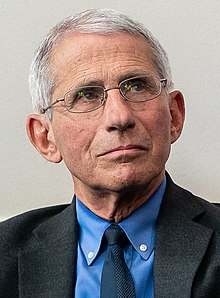Draft:Anthony Fauci conspiracy theories
 | Draft article not currently submitted for review.
This is a draft Articles for creation (AfC) submission. It is not currently pending review. While there are no deadlines, abandoned drafts may be deleted after six months. To edit the draft click on the "Edit" tab at the top of the window. To be accepted, a draft should:
It is strongly discouraged to write about yourself, your business or employer. If you do so, you must declare it. Where to get help
How to improve a draft
You can also browse Wikipedia:Featured articles and Wikipedia:Good articles to find examples of Wikipedia's best writing on topics similar to your proposed article. Improving your odds of a speedy review To improve your odds of a faster review, tag your draft with relevant WikiProject tags using the button below. This will let reviewers know a new draft has been submitted in their area of interest. For instance, if you wrote about a female astronomer, you would want to add the Biography, Astronomy, and Women scientists tags. Editor resources
Last edited by Bearcat (talk | contribs) 4 months ago. (Update) |
Anthony Fauci | |
|---|---|
 Fauci in 2020 | |
| Born | Anthony Stephen Fauci December 24, 1940 |
| Nationality | American |
| Education | College of the Holy Cross (BS) Cornell University (MD) |
| Occupation(s) | Physician, immunologist |
| Known for | National Institute of Allergy and Infectious Diseases, COVID-19 response |
Overview
[edit]Anthony Fauci, the American immunologist and director of the National Institute of Allergy and Infectious Diseases (NIAID), has been a central figure in the United States' response to the COVID-19 pandemic. Despite his prominence and longstanding career, Fauci has become the subject of numerous conspiracy theories, especially amid the highly polarized environment during the pandemic. These conspiracy theories range from claims about his role in the creation of the virus to allegations of financial motives.
Background
[edit]Dr. Anthony Fauci has served under multiple U.S. presidents, starting with Ronald Reagan, and has been involved in responses to various health crises including HIV/AIDS, SARS, and Ebola. With the onset of the COVID-19 pandemic, Fauci emerged as a key advisor, frequently appearing in public briefings and media interviews to provide updates and guidance on the evolving situation.
Conspiracy Theories
[edit]The conspiracy theories surrounding Anthony Fauci are diverse and widespread. These theories have been disseminated through social media, fringe websites, and even mainstream media channels, contributing to misinformation and public confusion.
Lab Origin Theory
[edit]One of the most persistent conspiracy theories claims that Dr. Fauci was involved in the creation or funding of the SARS-CoV-2 virus in a laboratory in Wuhan, China. Proponents of this theory often cite Fauci's support of gain-of-function research, which involves manipulating viruses to study their potential impact on humans. Critics argue that Fauci's support of such research indirectly led to the pandemic, though there is no credible evidence to support this claim.
Financial Motives
[edit]Another prominent theory suggests that Fauci has financial interests in the COVID-19 vaccines. This theory posits that Fauci has invested in pharmaceutical companies developing vaccines, thereby profiting from the pandemic. Investigations have found no substantial evidence to support these claims, and Fauci has publicly stated that he does not hold patents related to COVID-19 vaccines.
Political Allegations
[edit]Fauci has also been accused of being part of a larger political conspiracy to undermine former President Donald Trump. Critics argue that Fauci's recommendations and public statements were politically motivated to damage Trump's re-election prospects. These allegations intensified after Fauci contradicted Trump on several occasions regarding the severity of the virus and the efficacy of certain treatments.
Republican and Conservative Criticism
[edit]Conspiracy theories about Anthony Fauci have gained particular traction among Republican and conservative groups in the United States. Some Republican lawmakers and conservative media personalities have openly criticized Fauci's handling of the pandemic, alleging that he exaggerated the threat of COVID-19 to undermine Trump's presidency. These critics argue that Fauci's recommendations, such as mask mandates and lockdown measures, were unnecessarily restrictive and economically damaging.
Criticism from conservative circles intensified during the 2020 presidential election campaign, with accusations that Fauci's advice was biased against Trump's policies and aimed at influencing public opinion against the Republican administration. This narrative was amplified through conservative media outlets and social media platforms, contributing to widespread skepticism among conservative-leaning individuals regarding Fauci's credibility and intentions.
Misinformation Spread
[edit]Social media platforms have played a significant role in the spread of conspiracy theories about Fauci. Viral posts and videos often feature out-of-context statements or fabricated quotes attributed to Fauci, further fueling public mistrust. Efforts to debunk these myths have been undertaken by fact-checking organizations and health authorities, but the spread of misinformation remains a challenge.
Impact and Consequences
[edit]The proliferation of conspiracy theories has had tangible impacts on public health efforts. Fauci and his family have received threats, necessitating security measures. Additionally, these theories have contributed to vaccine hesitancy and resistance to public health guidelines, complicating efforts to control the pandemic.
Public Perception
[edit]Public perception of Fauci is deeply divided. While many view him as a trusted and reliable source of information, others see him as a controversial figure. Polls indicate that trust in Fauci correlates strongly with political affiliation, reflecting the broader polarization in American society.
Media Coverage
[edit]Media coverage of Fauci and the associated conspiracy theories has been extensive. Major news outlets have both defended Fauci and scrutinized his actions, often reflecting the political leanings of their audiences. This coverage has further polarized public opinion and contributed to the spread of conspiracy theories.
Conclusion
[edit]The conspiracy theories surrounding Anthony Fauci are indicative of the broader challenges faced during the COVID-19 pandemic. These theories highlight the intersection of public health, politics, and misinformation in an era of widespread digital communication. While efforts to combat misinformation continue, the enduring impact of these conspiracy theories underscores the need for ongoing public education and transparent communication from health authorities.
References
[edit]External Links
[edit]
